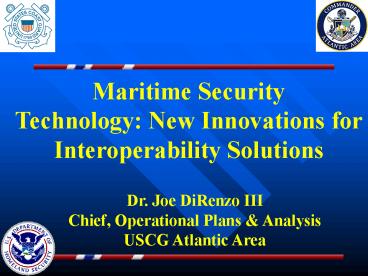U.S. COAST GUARD ATLANTIC AREA - PowerPoint PPT Presentation
1 / 14
Title:
U.S. COAST GUARD ATLANTIC AREA
Description:
The Critical Nature Of The Security of the Maritime Transportation System ... (1) the Strait of Hormuz, the Suez Canal, and the (4) Strait of Malacca and ... – PowerPoint PPT presentation
Number of Views:67
Avg rating:3.0/5.0
Title: U.S. COAST GUARD ATLANTIC AREA
1
Maritime Security Technology New Innovations
for Interoperability Solutions
Dr. Joe DiRenzo III Chief, Operational Plans
Analysis USCG Atlantic Area
2
OverviewSetting The Stage
- The Criticality of the MTS
- The Maritime Asymmetric Threat
- Technological applications for Maritime Security
3
The Critical Nature Of The Security of the
Maritime Transportation System
- Michael Richardson, author of A Time Bomb for
- Global Trade Maritime-Related Terrorism in an
Age - of Weapons of Mass Destruction explains
- The global economy is built on integrated supply
- chains that feed components and other materials
to - users just before they are required and just in
the right - amounts. That way, inventory costs are kept low.
If the - supply chains are disrupted, it will have
repercussions - around the world, profoundly affecting business
- confidence.
4
The MTS Role In The Global Economy
- Why is the MTS so critical?
- Dr. Stephen Flynn noted, The combination of
tremendous volume, need for rapid movement and
complex transport mechanisms severely challenges
security systems thus creating a huge potential
for terrorist to use containers as modern day
Trojan Horses to smuggle weapons of WMD into the
U.S.
5
Why Is The MTS A Vulnerable Target?
- Two Primary Reasons
- Commercial ships, transporting 80 of world trade
commodities! In the USA. 361 ports, 95,000 miles
of coastline and over 17 million containers
entering the U.S. In 2002 (the latest year for
which international data are available), the U.S.
was the largest trading nation in the world for
both exports and imports of goods and services.
The U.S. accounts for roughly 19 percent of the
world goods trade and about 15 percent of world
services trade. - (2) With merchant vessels critical to the global
economy, a disruption of the sea routes. For
example,attacks against the tankers that carry
about two-thirds of the world's oil would
precipitate a debilitating economic crisis.
Globally, merchant ships follow fixed,
predictable, and therefore vulnerable routes,
they traverse choke points, including (1) the
Strait of Hormuz, the Suez Canal, and the (4)
Strait of Malacca and the St Lawrence Seaway!
6
Threat or Vulnerability?
- So Whats The Threator would Vulnerability be a
better term?
7
The Al Qaeda Campaign Plan A Starting
Point?
According to TIME magazine - in 2002 Osama bin
Laden directed that maritime operation be
undertaken by al Qaeda operatives, headed by
Abdul al-Rahim al-Nashiri . Al-Nashiri based his
operation on four pillars Using a Zodiac)
speed boat packed with explosive to ram
warships Using medium sized boats as bombs to
be blown up near slips or ports Using
airplanes to ram boats Having underwater
demolition teams.
8
Small Boat Threats?Can Technology Help?
- Among the most experience traditional terrorist
groups that possess maritime suicide capabilities
are Al Qaeda. the Middle Eastern Palestinian
Liberation Front (PLF), Fatah, Hezbollah and the
South East Asian Liberation Tigers of Tamil Eelam
(LTTE), the Abu Sayyaf Group (ASG) , Jemaah
Islamiyah (JI) and possibly domestic terrorists?
9
Why Maritime Suicide Terrorism?
- Dr. Robert Pape, of the University of Chicago
believes - gt Basically a punishment strategy
- gt Similar to other punishment strategies
- Airpower Douhet
- Economic sanctions
- gt Does two things
- Inflicts immediate punishment against target
society - Threatens more punishment in the future
- gt Suicide sends a powerful message
- Attacker could not be deterred
- Allows for the act of martyrdom
- Connects attacker to a broader community
10
Maritime Shipping Containers A Trojan Horse
Threat to the US Canada?
11
Underwater Threat Can Technology Help?
April 24th, 2005 Times of London noted that a
Senior English Ministry of Defence (MoD) police
officer has disclosed that militants using
techniques learnt in western diving schools to
attack Royal Navy ships are considered the main
threat to the event. Officials fear Al-Qaeda
divers could attach bombs to the hulls of the
ships, detonate explosives strapped to their
bodies in suicide attacks or even board vessels
and kill some of those on board. Divers can
conduct suicide missions as easily as small boats!
12
Technologies for Maritime Security of Interest
to Canada U.S.
- X-Ray, Gamma Ray Neutron
- Scanning at Ports
- Biometrics (Small Boats and Smugglers)
- RPID (Radio Frequency Identification) Tag
- Underwater Surveillances
- Smart Containers (Sensor for Detection of
Tampering/GPS RCVR/Transponder)
13
Leverage TechnologyWhat Makes Sense
- - Research low-cost, non-intrusive, small vessel
ID - systems/boarding equipment
- - Develop anomaly detection and automated scene
understanding (Nanotechnology) Nanotechnology
Initiative - - Research improved methods of protecting
Critical Infrastructure - - Improve ability to respond to security and
safety zones intrusions, especially underwater. - -Research and invest in maritime rad/nuc
detection - technology (micro-sensors)
14
Thank You!
Dr. Joe DiRenzo III (757) 398-6695 Joseph.dire
nzo_at_uscg.mil































